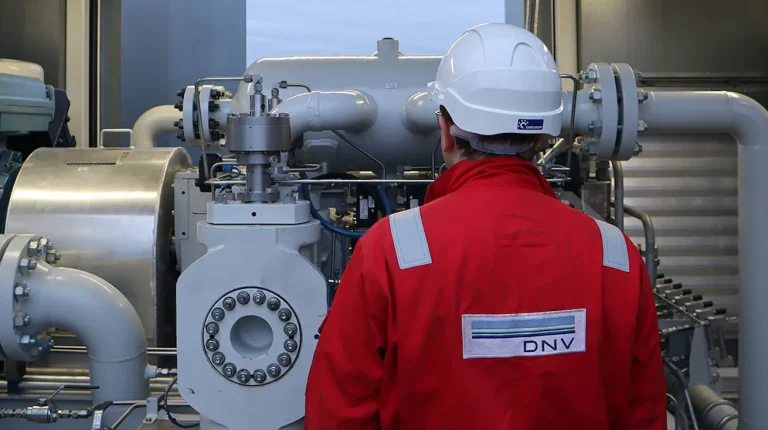DNV has released a standard that sets requirements and an industry benchmark for the safe design, construction and operation of electrolyzer systems and components. It aims to support the safe and efficient development of the hydrogen industry.
This standard builds on insights from a joint industry project (JIP) involving 30 global partners, establishing a fully integrated standard for electrolyzer systems. It is tailored to address hazards unique to hydrogen technologies and offers solutions that align with industry best practices and emerging global regulations.
The new standard, DNV-ST-J301 Electrolyser systems, has been embedded in DNV’s certification framework for the equipment and facilities used in producing hydrogen and its derivatives through water electrolysis. This standard integrates with ISO 22734 Hydrogen generators using water electrolysis, which it complements to offer an unparalleled framework for safety and compliance.
The organization highlights that hydrogen production carries specific risks requiring robust safety measures. DNV-ST-J301 is intended to address these challenges with a comprehensive, risk-based approach covering the entire lifecycle of electrolyzer systems. The standard consolidates all technical safety requirements into a single, clear document, simplifying compliance while providing the hydrogen industry with a definitive benchmark for safe, reliable and scalable operations. Its release aligns with the recently announced EU Innovation Fund hydrogen auction, where certifications are expected to play a crucial role in project success.
Key features of the new standard
The new standard, DNV-ST-J301, provides a comprehensive framework to address the risks of hydrogen production through electrolyzers. It establishes detailed safety requirements for the design, construction and operation of these systems by defining proportionate actions based on risk severity to ensure both effective and cost-efficient compliance. DNV-ST-J301 not only focuses on the equipment itself, but further onto the integration at the plant level, thereby supporting early risk reduction for projects and stakeholders, saving money for developers in the long run.
Complementary guidance and certifications
In addition, DNV-RP-J302, a recommended practice for evaluating and testing electrolyzer performance, is scheduled for external hearing in the first financial quarter of 2025, and DNV-ST-J30x, a product standard, will soon be released. These complementary documents align with the forthcoming revision of ISO 22734, reinforcing DNV’s leadership in advancing the hydrogen industry.
Hydrogen as a decarbonization solution
“To boost market confidence and trust among industry participants, we need to standardize large-scale electrolyzer systems. This helps to reduce uncertainties and risks when integrating new assets with existing refineries or in greenfield renewable energy projects. This ensures the safety, quality, reliability and affordability of these projects,” said Prajeev Rasiah, executive vice president and regional director, Northern Europe, energy systems, at DNV. “About 30 years ago, we applied a similar approach in the wind energy industry. Now, we are collaborating with industry partners to develop cross-sector standards that ensure the safe scaling of renewable hydrogen.”
“This new standard provides a comprehensive validation framework, crucial for establishing a global electrolyzer industry for renewable hydrogen,” said Magnus Killingland, global segment lead for hydrogen and ammonia, energy systems, at DNV. “By enabling cost reductions through standardization, it ensures hydrogen’s viability as a clean molecule for the hardest-to-abate sectors.”
“DNV is at the forefront of creating standards and certification schemes for renewable hydrogen production. These efforts are critical for enabling global decarbonization,” said Peter Paschke, global lead – power-to-X, energy systems at DNV. “For companies participating in the recently announced EU Innovation Fund hydrogen auction, where the ISO 22734 standard is to be complied with, such certifications will be pivotal for success.”
Fostering a safe and sustainable hydrogen market
With the introduction of DNV-ST-J301 and its complementary service specifications, DNV offers the industry a cohesive framework to evaluate electrolyzers and power-to-x facilities comprehensively. This approach is projected to ensure safety, support cost efficiency, and build transparency and accountability in the rapidly evolving hydrogen sector.
In related news, DNV recently awarded approval in principle (AiP) to HD Korea Shipbuilding & Offshore Engineering (HD KSOE) for its electric propulsion liquid hydrogen (LH2 ) carrier design concept that could enable 80,000m3of LH2 storage and transportation. Click here to read the full story.



